英国文学史及选读(Lecture 1)
英国文学史及选读课件 1 History and Anthology

主要作家及作品选读
D.H.劳伦斯(D.H. Lawrence):劳伦斯是现 代英国文学的重要作家之一,他的作品以探 讨人性、爱情和性为主题,代表作有《儿子 与情人》(Sons and Lovers)和《查泰莱 夫人的情人》(Lady Chatterley's Lover) 等。
文学特点与影响
文学特点
强调个性、情感、想象力和自然;反对古典主义的规则和约束;寻求新的创作 灵感和表达方式。
对后世影响
浪漫主义文学对后世产生了深远的影响,包括对现代主义、后现代主义等文学 流派的启示;对自然和情感的关注也影响了后来的生态批评和女性主义批评等 文学理论。
06
现代时期英国文学
背景介绍
作品和作家。
提高文学鉴赏能力
02
通过阅读和分析经典文学作品,培养学生的审美意识、文学感
受力和批判思维。
拓展文化视野
03
通过了解英国文学的历史背景、文化内涵和社会意义,增进学
生对英国文化的认识和理解。
英国文学史概述
古代和中世纪文学
包括古希腊罗马文学影响、中世纪宗教文学 和骑士文学等。
文艺复兴时期文学
04
18世纪英国文学
背景介绍
18世纪英国社会变革
文学市场的形成
18世纪的英国经历了工业革命、政治 变革和社会转型,这些变化对文学产 生了深远影响。
随着印刷技术的进步和出版业的发展 ,文学作品得以更广泛地传播,形成 了文学市场。
启蒙运动的影响
启蒙运动的思想家们强调理性、科学 和进步,这些观念在18世纪英国文学 中得到了体现。
英国文学史及作品选读课件 Lecture 1(09级)
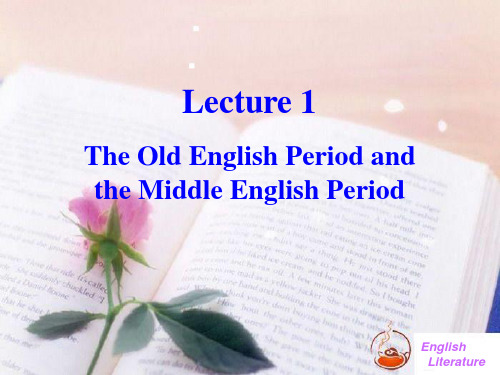
3. Help the students know clearly about Geoffrey Chaucer and his work The Canterbury Tales.
After the withdrawal of the Roman troops, England was soon invaded by three Germanic (Teutonic) tribes: the Angles, the Saxons and the Jutes.
By the 7th century some small kingdoms were combined into a United Kingdom called England (the land of Angles). Its people were called the English.
From 787, the English began to be troubled by bands of Danish Vikings.The great hero of the time was King Alfred the Great (849-901) of the Kingdom of Wessex in the south. It is to him that we owe much of the preservation of Old Anglo-Saxon Literature. Equally important is the fact that he started Anglo-Saxon Chronicle, a historical register of national events from dim past to his own age. The Anglo-Saxons were conquered in 1066 by the Norms from France. This is the end of
英国文学史及选读第一册

英国文学史选读第一册Part I The Anglo-Saxon Period(449-1066)The literature: The literature of this period falls naturally into two divisions: pagan(异教徒文学) and Christian(基督徒文学)Form: Alliterative verseThe coming of Christianity meant not simply a new life and leader for England; it meant also the wealth of a new language.Caedmon(开德蒙) wrote a poetic Paraphrase of the Bible.The great epic—The Song of Beowulf : The Song of Beowulf can be justly termed England’s national epic and its hero Beowulf—one of the national heroes of the English people.Part II THE ANGLO-NORMAN PERIOD (1066-1350) Background: the Normans headed by William, defeated the Anglo- Saxon.The literature:The literature is remarkable for its bright, romantic tales of love and adventure. English literature is also a combination of French and Saxon language.Literary work: Sir Gawain and the Green KnightTerm explanation:Romance(传奇): Romance was a type of literature that was very popular in the Middle Ages. It is about the life and adventures undertaken by aknight. It reflected the spirit of chivalry. The content of romance: love, religion, chivalry. It involves fighting and adventures.Part III GEOFFREY CHAUCER (1340?-1400)Geoffrey Chaucer, the “father of English poetry” and one of the greatestnarrative poets of England. Chaucer’s creative work vividly reflected the changes which had taken root in English culture of the second half of the14 century.thChaucer chose the metrical form(格律诗) which laid the foundation of the English tonico-syllabic verse. And also found the London dialect as the English literary language.Works: The Canterbury TalesTerm explanation:Popular Ballads:The most important department of English folk literature is the ballad. Ballads are anonymous narrative songs that have been preserved by oral transmission, usually in 4-line stanzas, with the second and fourth line rhymed. The subjects of ballads are various, as the struggle of young lovers against their feudal-minded families. Bishop Thomas was among the first to take a literary interest in ballads. There are various kinds of ballads: historical, legendary, fantastical, lyrical and humorous. The paramount ballad is Robin Hood and Allin-a-Dale .Comments on Robin Hood: Robin Hood is a partly historical and partlylegendary character. The first mention of Robin Hood in literature is in William Langland’s The Vision of Piers, the Plowman.The character of Robin Hood is many-sided. Strong, brave and clever, he is at the same time tender-hearted and affectionate. His hatred for the cruel oppressors is the result of his love for the poor and downtrodden.Works: Robin Hood and Allin-a-DaleGet up and Bar the DoorSir Patrick SpensPART IV THE RENAISSANCE(1485-1603) an age of drama and lyrical poetryThe 16 century in England was a period of the breaking up of feudal threlations and the establishing of the foundations of capitalism.Term explanation:Renaissance:1) renaissance was a cultural movement that spanned roughly the14 century to the 17 century. With the development ofth thbourgeois relationships and formation of the English national statethis period is marked by a flourishing of nation culture known asthe Renaissance. The term renaissance originally indicated arevival of classical(Greek and Roman) arts and sciences after thedark ages of medieval obscurantism(蒙昧主义). The greatest ofthe English humanists were Thomas More and William Shakespeare.2) Theme: the expression of secular values with man instead of Godas the center of the universe. It emphasizes the dignity of man, values of man.3) Two major types: drama and lyrical poetry.It affirms the earthly achievement, man’s desire for happiness and pleasure.Works:1. Thomas More: humanist,utopia (give a profound and truthful picture of the people’s sufferings and put forward his ideal of a future happy society.2. Francis Bacon: scientist and philosopher;his works may be divided onto three classes: the philosophical, the literary, and the professionalessays3. Thomas Wyatt: the first to introduce the sonnet into Englishliterature.4. Edmund Spenser: The Fairy Queen5. John Lyly: Eupheus; gave rise to the term “euphuism”,designating an affected style of court speech.6. Christopher Marlowe: the greatest pioneers of English drama;made bland verse the principal vehicle expression in drama.7. Robert Greene: George Green, the Pinner of Wakefield8. William Shakespeare: one of the first founders of realism, amaster hand at realistic portrayal of human characters andrelations.Hamlet ( Hamlet is considered to be thesummit of Shakespeare’s art. The whole tragedy is permeat edwith the spirit of Shakespeare’s own time. Hamlet is theprofoundest expression of Shakespeare’s humanism and hiscriticism of contemporary life.)PART V THE 17 TH CENTURYTHE PERIOD OF REVOLUTION AND RESTORATIONLiterary characteristics in this period:The 17 century was one of the most tempestuous periods in Englishthhistory. The contradictions between the feudal system and the bourgeoisie had reached its peak and resulted in a revolutionary outburst.(1)The Puritan influence:medieval standard of chivalry, the impossible love and romances perished. The Puritans believed in simplicity of life. They disapproved of the sonnets and love poetry. The Bible became now the one book of thepeople.(2) the exaggeration of the “metaphysical” poetsPoetry took new and startling forms. Prose became somber. The spiritual gloom sooner or later fastens upon all the writers of this age. This so- called gloomy age produced some minor poems of exquisite workmanship, and one great master of verse whose work would glorify any age or people---John Milton.(3) The French influence is most marked in the drama.Rimed couplets instead of blank verse;The unities, a more regular construction, and the presentation rather than individual;The comedies are coarse in language and their view of the relations between men and women is immoral and dishonest.(4) restoration created a literature of its own, that was often witty and clever, but on the whole immoral and cynical. The most popular genre was that of comedy those chief aim was to entertain the licentious aristocrats. John Dryden, critic, poet and playwright was the most distinguished literary figure of that time.John Donne:His prose style, involuted and ornate, cumulative and Ciceronian, is one of the more glorious monuments to the spirit of the early seventeenth century.Song (“ Go and Catch a Falling Star”)A Valediction: Forbidding MourningSonnet: Death be not proudJohn Milton: poet, Puritan, fight for human rights; in 1652 became totally blind.Paradise Lost: it is based on the biblical legend of the imaginary progenitors of the human race---Adam and Eve, and involves God and his eternal adversary, Satan in its plot. It presents the author’s views in an allegoric religious form, and the reader will easily discern its basic idea--- the exposure of reactionary forces of his time and passionate appeal for freedom.Sonnet: On His Blindness\Sonnet: On His Deceased WifeJohn Bunyan: spiritual independence, gave us the only great allegory. He was imprisoned for preaching without a license.The Pilgrim’s Progress: written in old-fashioned, medieval form of allegory and dream.Bunyan speaks in terse, idiomatic prose, and his characters are living men and women.PART VI THE 18 THCENTURY ( an age of prose and novel)THE AGE OF ENLIGHTENMENT IN ENGLANDThe theme: social reality, common people’s life.The enormous amount of eighteenth century writing devoted to transient affairs, to politics, fashions, gossip.Enlightenment: on the whole, was an expression of struggle of the thenprogressive class of bourgeoisie against feudalism. The enlighteners fought against class inequality, stagnation, prejudices and other survivals of feudalism. They attempted to place all branches of science at the service of mankind by connecting them with the actual deeds and requirements of the people. The problem of man comes to the fore, superseding all other problems in literature.1.Joseph Addison, Richard Steele: the publishers of a moralistic journal The Tatler and The SpectatorThese two magazines are the first important recognitions by literature of the special of the special interests of women readers, and also brought literature down to everyday life and kept it clean and wholesome.The essays and stories of Addison and Steele, devoted not only to social problems, but also to private life and adventures, gave an impetus to thedevelopment of the 18 century novel.thSir Roger是Joseph Addison塑造的经典形象。
英国文学史及选读
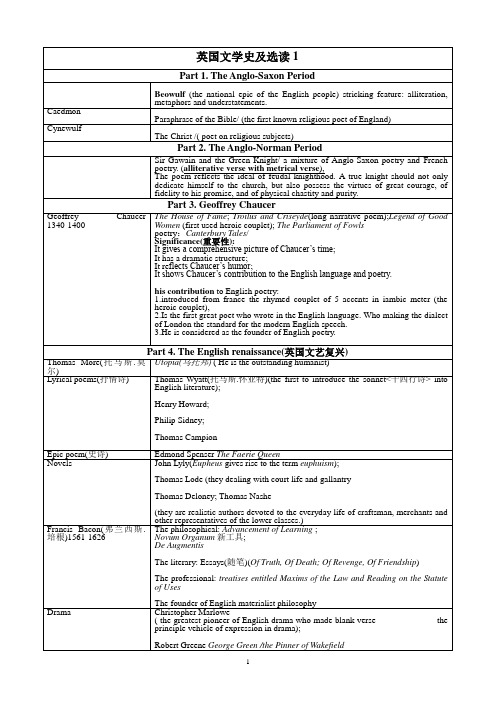
英国文学史及选读1Part 1. The Anglo-Saxon PeriodBeowulf (the national epic of the English people) stricking feature: alliteration, metaphors and understatements. CaedmonParaphrase of the Bible/ (the first known religious poet of England) Cynewulf The Christ /( poet on religious subjects)Part 2. The Anglo-Norman PeriodSir Gawain and the Green Knight/ a mixture of Anglo-Saxon poetry and French poetry. (alliterative verse with metrical verse ), The poem reflects the ideal of feudal knighthood. A true knight should not only dedicate himself to the church, but also possess the virtues of great courage, of fidelity to his promise, and of physical chastity and purity.Part 3. Geoffrey Chaucer Geoffrey Chaucer 1340-1400The House of Fame ; Troilus and Criseyde (long narrative poem);Legend of Good Women (first used heroic couplet); The Parliament of Fowls poetry :Canterbury Tales / Significance(重要性): It gives a comprehensive picture of Chaucer’s time ; It has a dramatic structure; It re flects Chaucer’s humor ; It shows Chaucer’s contribution to the English language and poetry. his contribution to English poetry: 1.introduced from france the rhymed couplet of 5 accents in iambic meter (the heroic couplet), 2.Is the first great poet who wrote in the English language. Who making the dialect of London the standard for the modern English speech. 3.He is considered as the founder of English poetry. Part 4. The English renaissance(英国文艺复兴)Thomas More(托马斯.莫尔) Utopia(乌托邦) ( He is the outstanding humanist) Lyrical poems(抒情诗) Thomas Wyatt(托马斯.怀亚特)(the first to introduce the sonnet<十四行诗> into English literature); Henry Howard; Philip Sidney; Thomas Campion Epic poem(史诗) Edmond Spenser The Faerie Queen Novels John Lyly(Eupheus gives rise to the term euphuism ); Thomas Lode (they dealing with court life and gallantry Thomas Deloney; Thomas Nashe (they are realistic authors devoted to the everyday life of craftsman, merchants and other representatives of the lower classes.) Francis Bacon(弗兰西斯.培根)1561-1626 The philosophical: Advancement of Learning ; Novum Organum 新工具; De Augmentis The literary: Essays(随笔)(Of Truth, Of Death; Of Revenge, Of Friendship ) The professional: treatises entitled Maxims of the Law and Reading on the Statute of Uses The founder of English materialist philosophy Drama Christopher Marlowe ( the greatest pioneer of English drama who made blank verse the principle vehic le of expression in drama); Robert Greene George Green /the Pinner of WakefieldWilliamShakespeare1564-1616 (37plays, two narrative poems, 154sonnets) The Tempest暴风风雨;The Two Gentlemen of Verona维罗纳二绅士;The Mercy Wives of Windsor温莎的风流妇人;Measure for Measure恶有恶报;The Comedy of Errors错中错;Much Ado about Nothing无事自扰;Love’s Labour’s Lost空爱一场;A Midsummer Night’s Dream仲夏夜之梦;The Merchant of Venice威尼斯商人;As You Like It如愿;The Taming of the Shrew驯悍记;All’s Well That Ends Well皆大欢喜;Twelfth Night第十二夜;The Winter’s Tale冬天的故事;The Life and Death of King John/Richard the Second/Henry the Fifth/Richard the Third约翰王/理查二世/亨利五世/理查三世;The First/Second Part of King Henry the Fourth亨利四世(上、下);The First/Second/Third Part of King Henry the Sixth亨利六世(上、中、下); The Life of King Henry the Eighth亨利八世;Troilus and Cressida脱爱勒斯与克莱西达;The Tragedy of Coriolanus考利欧雷诺斯;Titus Andronicus泰特斯·安庄尼克斯;Romeo and Juliet罗密欧与朱丽叶;Timon of Athens雅典的泰门;The Life and Death of Julius Caesar;朱利阿斯·凯撒;The Tragedy of Macbeth麦克白;The Tragedy of Hamlet哈姆雷特/王子复仇记;King Lear李尔王;Othello奥塞罗;Antony and Cleopatra安东尼与克利欧佩特拉;Cymbeline辛白林;Pericles波里克利斯;Venus and Adonis维诺斯·阿都尼斯;Lucrece露克利斯;The Sonnets十四行诗The Great Comedie(伟大的喜剧)s: A Midsummer Night’s Dream; The Merchant of V enice; As You Like It ;Twelfth Night;The Great Tragedies(伟大的悲剧): The Tragedy of Hamlet; Othello; King Lear; The Tragedy of Macbeth;The Later Comedies(romances): Pericles; Cymbeline; The Winter’s Tale; The Tempest;Part 5. The English Bourgeois revolution period and RestorationJohn Milton1608-1674 Shorter poems: L‘Allegro欢乐的人;Il Penseroso沉思的人;Comus科马斯;Lycidas;Principle pamphlets: Areopagitica论出版自由; Eikonoklastes; Defense for theEnglish people;Poem: Paradise Lost (The poem was written in blank verse); Paradise Regained;John Bunyan1628-1688 The Pilgrim’s Progress(It is the greatest English allegory, its style is simple and biblical)John Donne1572-1631 Poetry(love lyrics & religious poems);Sonnets(The founder of the Metaphysical school of poetry)John Dryden Critic, poet and playwright of restoration periodPart 6. The eighteenth CenturyThe Age of Enlightenment or The Age of ReasonEnlightenment Alexander Pope;Joseph Addison&Richard Steele The Spectator;Jonathan Swift;Daniel Defoe;Henry Fielding;Richard B. Sheridan;Oliver Goldsmith;Edward Gibbon;Samuel JohnsonPope exercised the greatest influence on the 18th century poetry;Swift is the most outstanding personality, Gulliver’s TravelsNeoclassicism John Dryden, Alexander Pope, Jonathan Swift, Joseph Addison, Richard Steele, Henry Fielding, Samuel Johnson, Oliver Goldsmith, Edward Gibbon The Decline & Fall of theRoman Empire Neoclassical poetry, as represented by Dryden, Pope & Johnson, reachedits stylistic perfection during the periodModern Realistic Novel Defoe Robinson Crusoe,Richardson,Fielding, Sterne, Goldsmith, T.G..Smollet’s satirical novel The adventures of Roderick RandomFielding and Smollet are the real founders of the genre of the bourgeois realistic novel in England and Europe.Richardson displays the innermost life of an individual, Pamela or Virtue Rewarded, he History of a Young Lady, The History of Sir Chares GrandionGothic Novel The real originator of English Gothic novel was Horace Walpole Castle of Otranto;Mary Shelley Frankenstein;Ann Radcliff The Mysteries of UdolphoSentimentalism Novels: Laurence Stern Sentimental Journey;Tristram Shandy;Oliver Goldsmith The Vicar of WakefieldPoetry: Thomas Gray’s An Elegy Written in a Country Churchyard;Goldsmith’s The Deserted Village;George Crabbe The VillageSatire Pope , Swift, Richard B. Sheridan School for ScandalPre-Romanticism in poetry, which was ushered in by Percy Macpherson & Chatterton, and represented by William Blake&Robert Burns。
英国文学史及选读1翻译
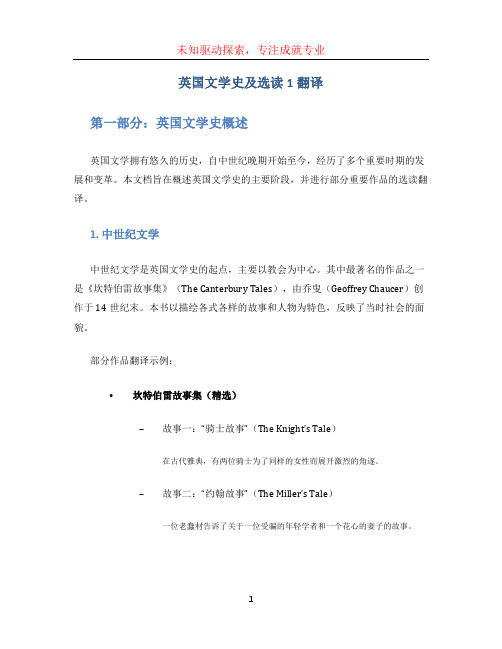
英国文学史及选读1翻译第一部分:英国文学史概述英国文学拥有悠久的历史,自中世纪晚期开始至今,经历了多个重要时期的发展和变革。
本文档旨在概述英国文学史的主要阶段,并进行部分重要作品的选读翻译。
1. 中世纪文学中世纪文学是英国文学史的起点,主要以教会为中心。
其中最著名的作品之一是《坎特伯雷故事集》(The Canterbury Tales),由乔叟(Geoffrey Chaucer)创作于14世纪末。
本书以描绘各式各样的故事和人物为特色,反映了当时社会的面貌。
部分作品翻译示例:•坎特伯雷故事集(精选)–故事一:“骑士故事”(The Knight’s Tale)在古代雅典,有两位骑士为了同样的女性而展开激烈的角逐。
–故事二:“约翰故事”(The Miller’s Tale)一位老蠢材告诉了关于一位受骗的年轻学者和一个花心的妻子的故事。
2. 文艺复兴时期文艺复兴时期是英国文学史上的黄金时期,涌现出许多重要的作家和作品。
莎士比亚(William Shakespeare)是这一时期的代表性人物,他的作品包括戏剧、sonnet 等多种形式。
此外,约翰·密尔顿(John Milton)的《失乐园》(Paradise Lost)也被认为是文艺复兴时期的经典之作。
部分作品翻译示例:•莎士比亚戏剧选读-《哈姆雷特》(Hamlet)-《罗密欧与朱丽叶》(Romeo and Juliet)-《麦克白》(Macbeth)•约翰·密尔顿《失乐园》(选读)探讨人类起源、罪恶和救赎的叙事诗,描述了亚当和夏娃被逐出伊甸园的故事。
3.18世纪启蒙运动18世纪是英国文学史上启蒙运动的时期,以理性和思想自由为核心。
重要的作家包括弥尔顿(John Milton),斯威夫特(Jonathan Swift)和詹姆斯·麦克菲尔(James Macpherson)。
部分作品翻译示例:•斯威夫特《格列佛游记》(选读)这本小说通过一个航海家的冒险旅程,揭示了社会和政治问题,具有强烈的讽刺意味。
英国文学史及选读chapter 1

from the 9th to 10th centuries.
In late 9th century King Alfred the Great (A.D. 849 – 901?) of the Kingdom of Wessex successfully led the English people in a protracted war against the invading Danes 丹麦人 who were threatening to overrun the whole country. The invaders were repulsed 击退 and gradually all the kingdoms in England were united into one.
During their rule the Romans built roads, walls, garrisons 要塞, villas 附有地产的乡间宅 第或庄园, etc., and the Celts became either slaves or unfree cultivators耕者 of the land. Then in early 5th century, as the Germanic 日 耳曼民族的 races attacked and overran侵占 the Roman Empire, the Roman garrisons 守 备部队 in Britain withdrew.
英国文学史与选读课件1

British literatureLecture 1About the authors•Social background•Life experience•Point of view (political/ literary)•Poet / novelist / dramatist (playwright) / essayist (prose writer) •Achievement/ contribution•Social status (position)•Representative worksAbout the works•Synopsis (the plots/ stories)•Theme•Characters (heroes/ protagonist/ antagonist)•Social significance/ importance•Artistic features: techniques•figures of speech (修辞)•Simile, metaphor, personification, symbol, irony, paradox, metonymy, synecdoche, overstatement/ understatement , alliteration and so on•Find the definition of the above termsThe period of English Literature•I. Early and Medieval English Literature•II. The English Renaissance (14th-16th century)•III. The Period of Bourgeois Revolution andRestoration (17th C.)•IV. Neoclassical Period--- The Age of Reason andEnlightenment (18th C.)•V. Romantic period( early 19th--- wwII)•VI. Critical Realism ( Victoria Period/ the second halfof the 19th C. )•VII. Modern Period (20 th C.)2. Early and Medieval LiteratureQuestions:1.The literature forms of Anglo-Saxon period?2.what’s the “England national epic”?3. The story of “Beowulf”4. What are the three battles of Beowulf ?5. The definition of “epic”6. The literature forms of Anglo-Norman period?7. What is “romance”?8.The class feature of the RomanceEpic (Heroic Poetry): This term is applied to great and lengthy narrative poems describing some important national enterprise or the adventures of distinguished heroes. (史诗)eg:Homer Odyssey《奥德赛》Dante’s Divine Comedy《十日谈》Milton Paradise Lost《失乐园》Romance: it was a long composition, sometimes in verse, sometimes in prose, describing the life and adventures of a noble hero.Class Feature of the Romance: the theme of loyalty to king and lord was repeatedly emphasized in romances, as loyalty was the corner-stone of feudal morality, without which the whole structure of feudalism would collapse.Sir Gawain and Green Knight 《高文爵士和緑衣骑士》3. ChaucerLife:⏹Born in a middle-classfamily in London⏹Is said to have studied atOxford and Cambridge⏹Became a man of affaires, undertaking various diplomatic missions to the Continent as courtier, diplomat and civil servant⏹Died in 1400,buried in Westminster Abbey, there established the poets’ corner Westminster Abbey (西敏寺)⏹An Abbey of monk on the bank of the Thames. The state church in England.⏹It was destroyed and rebuilt several times.⏹Chaucer w as first buried in the Abbey, then established “Poets’ corner”.⏹It is an honor for a poet or his monument to be buried there.Literary Career:⏹His experience gave him chance to obtain a good knowledge of Latin, French and Italian.⏹Three periods:The first period consists of works translated from French, as “The Romaunt of the Rose”The second consists of works adapted from the Italian, as “Troilus and Criseyde.”(based on Boccacio’s poem Filostrato)The third includes “The Canterbury Tales”, which is purely English.⏹Translator⏹“The father (founder) of English poetry” -- John Dryden⏹“Founder of English realism” -- GorkyThe first short-story teller and first morden poet in E.L.Forerunner of humanismThe City Canterbury⏹Canterbury is a city and metropolitan district in Kent England, and an important Romantown.⏹The capital of the Saxon Kingdom of Kent.The Canterbury Tales 《坎特伯雷故事集》⏹A collection of stories⏹Pilgrim, pilgrimage⏹The Tabard Inn, a tavern in Southwark, near London.⏹A gigantic plan of 124 stories, but only 24 were written.⏹The verse models Boccaccio’s Decameron in formThe Prologue (楔子)⏹A prologue is an introduction or preface, often in verse, to a literary work, esp. a play ⏹The prologue provides a framework for the tales. There is an intimate connection between the tale and the prologue, both complementing each other.The Gneral Prologue (the original version)Whan that Aprill, with his shoures sooteThe droghte of March hath perced to the roote,And bathed every veyne in swich licourOf which vertu engendred is the flour;Whan zephirus eek with his sweete breethInspired hath in every holt and heethThe tendre croppes, and the yonge sonneHath in the Ram his halve cours yronne,And smale foweles maken melodye.Heroic Couplet (Iambic pentameter英雄双韵体⏹A pair of rhymed lines of verse of equal length, in the form of ten syllables and five stresses in each line. It was first used by Chaucer. Its master is Alexander Pope.⏹Alliteration(头韵)An alliterative verse, certain accented words in a line begin the same consonants sound. Alliteration is the opposite of rhyme by which the similar sounds occur at the end of the syllables.Contribution⏹He presents a panoramic picture of English life in the Middle Ages.⏹He brought a realistic tone to English literary creation. All his characters are true to life ⏹He introduced Rhymed stanzas, instead of the old Anglo-Saxon (alliterative verse)⏹He first wrote in the current English form of the time. His poetry is acknowledged as the literary language of the country, which is usually called middle English.The language of Chaucer⏹Middle English --- is closer to Old English, the language of the Anglo-Saxons, and Norman French, the language of William the ConquerorFeatures in Chaucer’s writing⏹Rhymed stanzas of various type⏹Simplicity in characterization⏹Satirical and humorous tone⏹narrativeAbout the prioress⏹Higher orders of the religious group⏹Speaks French-- the aristocratic language⏹Tenderness, pity, gentility⏹Overly concern about her personal appearance ⏹Satiric tone。
英国文学史及选读第一册Lecture1 beowulf——chaucer
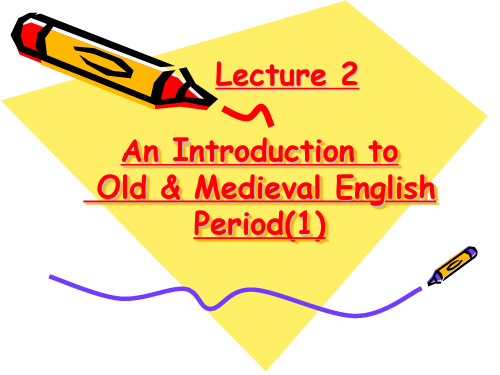
Ⅳ Literary terms : Epic (or Heroic Poetry)
-- It is, originally , an oral narrative poem, majestic both in theme and style. -- With legendary or historical events of national or universal significance. -- Examples include the ancient Greek epics by the poet Homer, the Iliad and the Odyssey. (《伊利亚特》 和 《伊利亚特》 奥德赛》 《奥德赛》)
Old English Quiz
Q: What great warrior defeated Grendal? A. Hrothgar B. Caedmon C. Beowulf D. Bede
After-class Assignment
PREVIEW Job for Next Week:
--- The chief effects of Norman Conquest;
Ⅱ General Knowledge About Beowulf Theme: the heroic deeds of old time; a hero killing monsters (Grendel, a monster (Grendel, halfhalf-human, Grendel’s mother and a firefirebreathing dragon )to make the world safe for people Main Characters: Beowulf (a glorious hero, a savior of the people)and monsters Rhyme: Alliteration Comments: -- The very beginning of English poetry; -- World classics as Odyssey
英国文学选读Lecture+1+Chaucer
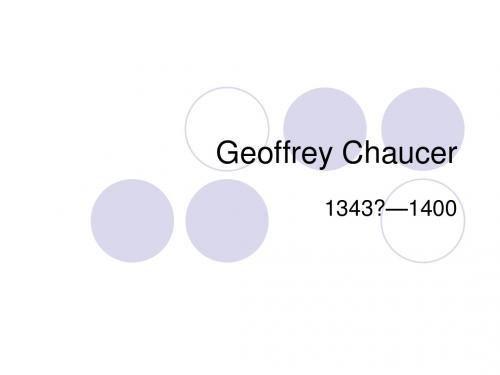
He nevere yit no vilainye ne saide In al his lif unto no manere wight. He was a verray, parfit, gentil knight.
no manere wight: any sort of person. In Middle English, negatives are multiplied for emphasis: as in these two lines: “nevere,” “no,” “ne,” “no.”
At Alisaundre he was, whan it was wonne.
Alisaundre: The Knight has taken part in campaigns fought against all three groups of pagans who threatened Europe during the 14th century: the Moslems in the Near East, from whom Alexandria was seized after a famous siege; the northern barbarians in Prussia, Lithuania, and Russia; and the Moors in North Africa. The place names in the following lines refer to battlegrounds in these continuing wars.
“Heroic” and “chivalric” are two key words people often use to describe the moral values of the Old and Medieval English Periods. Which of the two words goes for the Old English Period, and which for the other? What is (are) the major difference (s) between heroic and chivalric codes of behavior?
英国文学史及选读 第一节课 Introduction

What are we going to learn in this course? • Syllabus for this course see the contents of the textbook
一、课程性质与任务
• 该门课程在英语专业人才培养中旨在使学生从 英国历史、语言、文化发展的角度,掌握英国 文学各个时期的主要文学、文化思潮,文学流 派,主要作家及其代表作,同时帮助学生对英 国文学的发展有深刻的了解和认识,并通过介 绍一些最基本的文化理论和批评方法,对部分 在思想上艺术上有代表性,有影响的作家及作 品进行分析、导读,增强学生对英国文学的形 成和发展的理解,提高他们对文学作品的鉴赏 能力和文学修养。
History and Anthology of British Literature
Today’s Schedule
• Introduction Why do we study British literature? What is literature? What are we going to know in this course?
•
五、教学的重点、难点
• • • • • 1. 文艺复兴时期:莎士比亚 2. 十七世纪:多恩、弥尔顿 3. 十八世纪:笛福、斯威福特、布莱克、彭斯 4. 浪漫主义时期:华兹华斯、拜伦、雪莱、济慈 5.十九世纪:狄更斯、简·奥斯汀、勃朗特姐妹、 丁尼生 • 6. 二十世纪:哈代、王尔德、劳伦斯、乔伊斯
• As Robert Frost says, literature is a performance in words. It is the work of men who are specially sensitive to the language of their time and who use the skill of languagife.
英国文学史及选读1

英国文学史及选读11.H istorical BackgroundCelts 400B.C. Romans 50B.C. Anglo―Saxons 450A.D Norman Invasion 1066A.D. Roman empire从albion撤军,teutonic tribes(包括angles, Saxons,jutes)(条顿人or日耳曼人)陆续登陆此地。
2. Literature 1,pagan异教徒文学2 christian基督徒文学alliterative verse头韵诗Epic: Beowulf贝奥武甫(Denmark背景)(the hall heorot 鹿兀grendel:a monster half-human)1) Oral origin, recited in court, handed down in generations until finally it was recorded by certain poet.上下部分由pagan写,插入由christian写。
2) a mixture of history and legend.,england’s nationalepic 民国史诗诺曼时期1.H istorical BackgroundRoman conquest,接着是english conquest,最后是norman conquest。
The Norman Conquest in 1066Duke William of Normandy claimed himself William I, King of England.(the battle of hastings希斯廷战役)Kings―Barons男爵―Knights, a feudal system of hierarchy统治集团was formed。
2.T he language3.The literatureRomance was a type of literature that was very popularin the Middle Ages. It is about the life and adventures undertaken by a knight.It reflected the spirit of chivalry骑士制度. The content of romance: love, chivalry and religion. It involves fighting, adventures.Subject matter:Geoffrey’s History杰弗里《史记》,riming chronicles押韵编年史,metricalverse格律诗体,doggerel verse打油诗体1)t he Matter of France eg. Charlemagne and his peers查理曼大帝和他的骑士2)M atter of Greece and Rome eg Akexabder亚历山大大帝3)M atter of Britain tales having for their heroes Arthurand his knights of the Round Table3.m ain literatureSir Gawain and the green knight.高文爵士和绿衣骑士(arthur,gawain,green knight, morgain the fay-woman妖精摩根, the green girdle绿腰带)Part III Geoffrey Chaucer (1340―1400)杰弗里.乔叟时期1.H istorical BackgroundThe English won, they controlled large French territory领土. The Henry VI lost it all. He is father of English poetry War of the Roses 1455-1485 AD。
英国文学史及选读1教学大纲

英国文学史及选读1教学大纲课程编号:50411852课程名称:英国文学史及选读1英文名称:History and Anthology of English Literature 1学分:2总学时:36适用年级专业(学科类):英语专业三年级第一学期一、一、课程说明(一)指导思想本教学大纲是根据《高等学校英语专业英语教学大纲》制定的。
高校英语专业的学生不仅应具有扎实的语言基本功,还应具有广博的人文知识和较高的文化素质,英国文学史及选读这门课程不仅可以增强学生的语言基本技能和综合运用语言的能力,还可以扩大知识面,提高自身的文化素养,学会欣赏和分析文学作品,培养对西方文化的敏感性和宽容性,提高独立思考、分析和解决问题的能力。
(二)课程目的和要求英国文学史及选读这门课的目的在于培养学生阅读、欣赏、理解英国文学原著的能力,掌握文学批评的基本知识和方法。
通过阅读和分析英国文学作品,促进学生语言基本功和人文素质的提高,增加对西方文化的了解和对文化差异的敏感性、宽容性。
批判地吸收世界文化精髓。
熟悉英国文学发展的进程。
了解不同时期、不同流派的作家写作的时代背景,把握时代特征。
了解作家的创作思想、创作过程以及作品的思想内涵及艺术特色。
能熟练地使用各种英英词典以及大型百科全书如(Encyclopedia Britannica,Encyclopedia Americana),独立解决学习中遇到的语言和背景知识方面的问题。
能读懂有一定难度的文学原著和历史传记,要求在理解的基础上分析文章的思想观点、篇章结构和文体风格。
能写读书报告、课程论文。
(三)教学的重点、难点1、1、文艺复兴时期:莎士比亚2、2、十七世纪:弥尔顿、班杨3、十八世纪:蒲柏、笛福、斯威福特、理查逊、菲尔丁(四)知识范围及与相关课程的关系知识范围:本课涵盖历史、文化及文学方面的知识,包括英国文学不同时期的历史文化背景、文学特征,不同题材的著名作品如诗歌、戏剧、小说及散文的学习和分析。
英国文学史及选读课件 1 History and Anthology

1832
1901
Unit 1 AngloThe Anglo-Saxon Period
(449 - 1066)
Basic Background
1. The formation of Britain:
Time Before B. C. 55 --B. C. 55 Romans Invasion (Julius Caesar) Celts Albion main events names of population Celts names of Britain Albion
epic
• An extended narrative poem in elevated or dignified language, celebrating the feats of a legendary or traditional hero. • 史诗:用严肃或庄重的语言写成的叙事 长诗,歌颂传奇中或历史上英雄的丰功 伟绩
Anglia AngleAngle-land England
2. Social Background:
• 1)The Anglo-Saxons were in the later Anglostages of tribal society, and feudalism封建制 度 assumed definite shape. • 2) Agriculture developed and trade expanded.
Timeline of British literature
17th century; 18th century (the Neoclassical period 新 古 典 主 义 时 期 , Enlightenment, the rise of novel )→ 4. 19th century (Romanticism 浪 漫 主 义 , Victorian age, Realism) → 5. 20th century (Naturalism 自 然 主 义 , Modernism, Post-modernism) 3.
The renaissance 英国文学史及选读课件
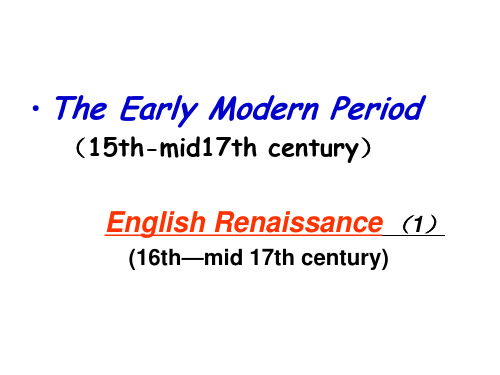
Historical background
Ideologically
• epics: Homer, Vigil, Dante//Spenser, Milton
• sonnets: Petrarch, Dante// Shakespeare, Sidney “Arcadia”, Jonson, Donne and Andrew Marvell
Literature
2. English literature
Historical background
Ideologically
• 1. Copernicus (1473-1543, Polish astronomer) and German Johannes Kepler about the center of the universe (heliocentric, not Earth, E circles around the Sun)
2.Renaissance:
•
Renaissance means revival, specially
between the 14th and mid 17th century, revival
of interest in ancient Greek and Roman culture.
• Renaissance, therefore, in essence, was a historical period in which the European humanist thinkers and scholars made attempts to get rid of conservatism(保守主义) in feudalist Europe and introduce new ideas that expressed the interests of the rising bourgeoisie, to lift the restrictions in all areas placed by the Roman church authorities.
- 1、下载文档前请自行甄别文档内容的完整性,平台不提供额外的编辑、内容补充、找答案等附加服务。
- 2、"仅部分预览"的文档,不可在线预览部分如存在完整性等问题,可反馈申请退款(可完整预览的文档不适用该条件!)。
- 3、如文档侵犯您的权益,请联系客服反馈,我们会尽快为您处理(人工客服工作时间:9:00-18:30)。
The Flea
Mark but this flea, and mark in this, How little that which thou denies me is; Me it sucked first, and now sucks thee, And in this flea our two bloods mingled be; Thou know’st that this cannot be said A sin, or shame, or loss of maidenhead, Yet this enjoys before it woo, And pampered swells with one blood made of two, And this, alas, is more than we would do.
Requirements for this course: 1. Class attendance; 2. A wide reading before and after class; 3. Remembering some important facts; 4. Class discussion.
small wingless jumping insect feeding on human and other blood
over-indulge
Oh stay, three lives in one flea spare, Where we almost, nay more than married are. This flea is you and I, ant this Our marriage bed and marriage temple is; Though parents grudge, and you, we are met, And cloistered in the living walls of jet.
Reference books for this class: 1. 陈嘉、宋文林 著 《大学英国文学史》(2卷本),商务印书馆, 1996年。 2. 陈嘉 编《英国文学作品选读》(3卷本),商务印书馆,1981年 版,2003年重印。 3. Margaret Drabble, ed.《牛津英国文学词典》(第6版),外语教学 与研究出版社,2005年。 4. 罗经国 编注《新编英国文学选读》(2卷本),北京大学出版社, 1996年。 5.M. H. Abrams, gen. ed. The Norton Anthology of English Literature. New York and London: Norton, 1993, 2005. (The best reference book) Text book: 吴伟仁 编《英国文学史及选读》(2卷本),外语教学与研究出版 社,1988年版,2005年重印。
5. From the late 8th century to the early 11th century, British isles were constantly invaded by the Danes. Alfred the Great of Wessex (849-899) led the Anglo-Saxon kings to defeat the invaders by uniting their forces.
An Outline of English History from 6 Cent. B.C. to 1485
1. The Celts, the earliest settlers of the British Isles, migrated to the British isles at about 600 B.C. from the upper Rhineland.
habit
violation of what is sacred
Cruel and sudden, hast thou since Purpled thy nail in blood of innocence? Wherein could this flea guilty be, Except in that drop which it sucked from thee? Yet thou triumph’st, and say’st that thou Find’st not thy self nor me the weaker now; ’Tis true; then learn how false fears be; Just so much honour, when thou yield’st to me, Will waste, as this flea’s death took life from thee. Let us go then, you and I, When the evening is spread out against the sky Like a patient etherised upon a table. (From “The Love Song of J. Alfred Prufrock” by T. S. ast Saxon king, with help from William, Duke of Normandy, expelled the Danes from England. As an expression of gratitude for protecting his kingdom, Harold promised William to give his kingdom to him. So, in 1066 Normans under the leadership of William from northern France conquered England. This is known as the Norman Conquest. 2. The Anglo-Saxons were heathens upon their arrival in Britain. In 597 Pope Gregory the Great sent St. Augustine to England to convert the Anglo-Saxons. Within a century all England was Christianized. Churches were established and monks became the most learned in the country. Heathen mythology was gradually replaced by Christian religion. The Norton Anthology of English Literature gives a slightly different datum of the historical periods as follows: 43-ca. 420: Roman invasion and occupation of Britain. Ca. 450: Anglo-Saxon Conquest. 597: St. Augustine arrives in Kent; beginning of Anglo-Saxon conversion to Christianity.
英国文学史及选读
主讲人:刘立辉 (西南大学外国语学院)
History and Anthology of English Literature
What is Literature? Literature is a subject of man, for man, and by man. Man is a product of social relations, in which we can see the relations between man and man, man and nature, man and society, and finally man and God. All these relations can be found in literary works. Literary works, however, are different from works of history and philosophy. Literary works represent the relations by employing language tools. Think of The Dream of Red Mansions (also trans. as The Dream of the Red Chamber or The Story of Stone by 曹雪芹. History records facts which actually occurred, and philosophy does its exploitation in abstract terms. When we read literary works, we enjoy the charm brought forth by language. Literature is closely connected with history. If we know nothing of history, it is impossible for us really to understand a literary work. Now Let’s read John Donne’s short poem “The Flea,” and see what we can get about Donne’s age from the poem.
2. About 400 to 300 B.C. the Brythons (Bretons), one branch of the Celts, came to the British isles and from them came the name Britain. 3. From 55 B. C. to 407 A.D. the British isles were under the rule of Roman empire. Julius Caesar (102-44 B.C.) crossed the Dover Strait in 55 B. C., but Caesar himself only stayed there for a few weeks. Though the Romans built temples, roads, walls, and military camps, they made little influence on the cultural life of Celts. 4. About 450 A.D., Angles, Saxons, and Jutes invaded the British Isles. They settled in England, and drove the Celts into Wales, Scotland, and Ireland.
